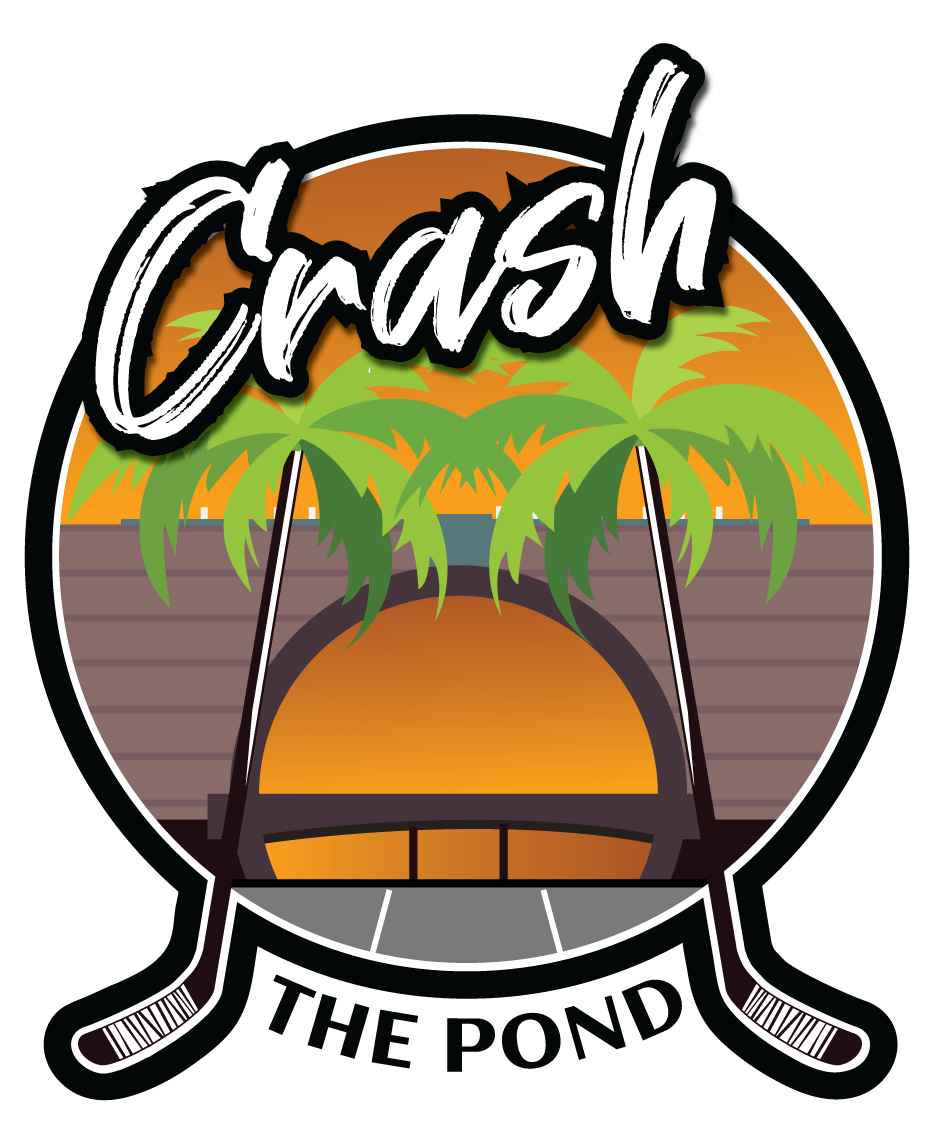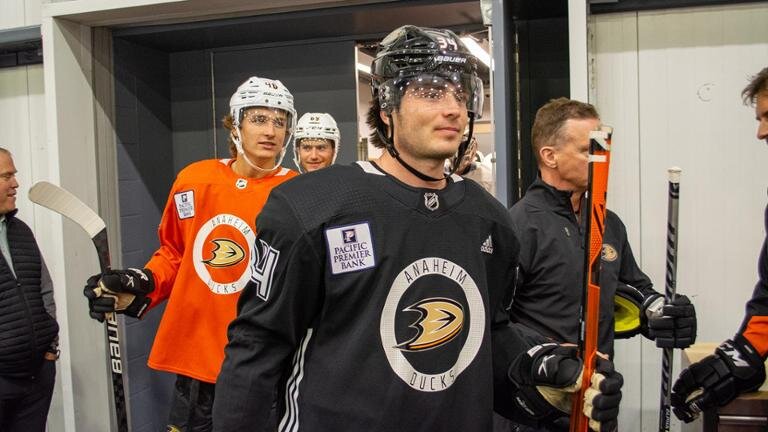The Anaheim Ducks are finally rebuilding, starting with the kids
Jake Rudolph also contributed to this article.
It’s a new era in Anaheim Ducks history. Yeah yeah, I know what you’re thinking.
“We’ve heard this before”
“What makes this year different from the last several?”
“Yeah, right”
To be honest, I don’t blame you. A healthy amount of skepticism borne out of three consecutive losing seasons, a lack of moves of veteran assets to expedite a rebuild, and limited communication from the team itself have understandably left fans coming into the 2021-22 season feeling pessimistic.
But as one of the self-proclaimed leaders of the critique bridge that has clearly voiced thoughts on the rebuild process, we’re here to let you know that the winds appear to be changing on Katella Avenue. The road is still long and there is plenty on the to-do list, but a breath of hope for those passionate fans wanting to see a clear and committed strategy to contention has flowed into the proverbial rink.
The Ducks organization itself has confirmed to Crash The Pond that they have fully committed to the rebuild process. The front office is finally embracing the undoubtedly difficult and delicate process of building a Stanley Cup contender over multiple years and is not expecting to be amongst the NHL’s most competitive teams.
The team admits that the previous strategy of incorporating young players like Troy Terry, Max Jones, Max Comtois, and others with the veteran core has not worked and that a shift in approach is necessary. This might be obvious given the Ducks’ standings placement the last several years, but to hear the organization admit and take accountability for it is a major step forward.
But even though the Ducks organization has finally committed to a full rebuild, they’re not going to embrace a tanking strategy. The team believes that losing, much like winning, can become a habit, and while they know they will likely not win every night, they still want to remain competitive. Limiting the blowout losses and the runs of being walked over by other teams is imperative to the organization’s rebuild philosophy.
This may sound like a stretch to some; something that the team is not in much of a position to ask given the state of the roster. But it’s an optimistic goal, and one that is good for a rebuilding organization to have as an optimistic guiding light that keeps those involved positive that the best is yet to come. This is especially important from a fan perspective. None of the Ducks faithful would be particularly keen to support a team like the Buffalo Sabres that consistently scraps rebuild plans and phones in the effort on an every-other-year basis.
That said, the team seems to be aware that this isn’t going to be a one-and-done rebuild season. While they don’t want this to go on for another four or five years, they do recognize that some level of patience will be required. This means that no one has a guaranteed spot on the roster. For top prospects like Trevor Zegras and Jamie Drysdale, their spot is not guaranteed coming out of training camp. For veteran players, especially those heading into free agency (and even some with term left on their contracts), no one is safe. Every veteran is available, sources tell Crash The Pond. For the right price of course. And the team is more willing than ever to use their cap space to acquire bad contracts for future assets, much like the David Backes deal that netted them a first round pick two seasons ago.
The fact of the matter is that losing seasons were always going to happen in Anaheim. After an unprecedented run of success from 2006 until 2018, the very nature of the NHL draft and salary cap has forced the team to become a shell of its former self and to let others take the mantle. It’s something every single successful team has to go through. Dread it, run from it, rebuilding arrives all the same.
To us at Crash The Pond, we have understood this from the beginning. It’s not the losing that we were frustrated with. It was the apparent lack of a clearly communicated plan to return to contention and the unrealistic playoff expectations that led many to be let down with the team’s play.
Now, with the Anaheim Ducks signaling to the fans that the rebuild is on, and with the sense that General Manager Bob Murray will remain the one to lead the team through this transitional period in addition to the fact that the organization has confirmed to Crash The Pond that new Assistant General Manager Jeff Solomon has free reign to build and oversee an analytics department as he sees fit, the tide appears to finally be turning.
The rebuilding starts at the draft and with the young players the Ducks hosted this past week at Great Park Ice in Irvine for Prospect Development Camp. For the first time since the COVID-19 pandemic, the Ducks got their prospects in the same facility to begin work on the future.
The hopeful future franchise cornerstones were there, including Trevor Zegras, Jamie Drysdale, and 2021 3rd overall draft pick Mason McTavish. Other prospects included 2021 draft choices Olen Zellweger and Sasha Pastujov as well as more known quantities like Jacob Perrault and Benoit-Olivier Groulx, among others. This was the first time that not only the public could see what many believe is a top 10 prospect pipeline in the NHL in person, but the Ducks front office as well thanks to extremely limited scouting opportunities due to the pandemic.
The organization believes that a proper rebuild begins with the draft. And it’s clear that many potential core pieces have been acquired through this avenue, with Zegras, Drysdale, and McTavish being the crown jewels of the lot. But even though Zegras and Drysdale have a not-insignificant number of NHL games under their belts, it’s clear that they know their spots aren’t guaranteed.
“First and foremost, I’m just trying to make the team out of camp,” Zegras told the media after Friday’s open practice. “We have a bunch of young guys and it’s going to be pretty competitive, so that’s where my mind is at.”
Ducks head coach Dallas Eakins expressed his admiration for that sentiment. “I love that mindset, that’s an important mindset for those kids that they are here to make the team,” he explained. “That’s music to my ears right there.”
Jamie Drysdale was experiencing his first development camp, despite already having 14 games in San Diego and 24 games in Anaheim last season thanks to the OHL shutdown during the pandemic. He talked about working on multiple aspects of his game, especially skating early on in the offseason, as one of the areas he focused on.
“I worked on everything, shooting all the pucks and skill skating. I started skating pretty early. I pinpointed a few things and I had skating sessions every week with my coach, working in the d-zone and on 2-on-1s and I feel really good out there,” the 2020 6th overall pick said.
The theme of improvement has clearly permeated from the organization, to the prospects, and beyond, as the focus for the immediate future shifts from the standings to the individual development of the players who are fighting to be the ones to lead the Ducks into the next chapter of the franchise.
One of the newest Ducks, Mason McTavish, believes that his time in the EHC (Switzerland’s second-tier pro league) last season with his OHL team the Peterborough Petes shut down for the year gave him valuable experience for the North American pros.
“Playing with pros, it’s not your typical junior year,” he explained. “It’s what they do every day. So just being professional and bringing that here,” McTavish told media when asked what the biggest thing he learned overseas was.
McTavish, specifically, exemplifies a shift in the organizational philosophy of bringing skill to the ice while also being hard to play against. It’s clear the Ducks believe they were not nearly as difficult to play against as they should have been. To some, this feels like the justification we have seen in the past for signing grinders who don’t provide much other than hitting and “protection” for younger players. But in the greater context of the modern NHL, the team believes that it is possible to walk the thin line of being difficult to play against while also bringing skill and multi-dimensional talent to the game. There seems to be a greater understanding, at least for now, that the myopic and singular view for specific, one-dimensional roles aren’t valuable anymore.
McTavish certainly fits that profile, with the Ducks believing that his big frame, ability to use his body to create space at both ends of the ice, and fantastic shot provide an ideal complement to Zegras’ abundance of skill and finesse.
Watching McTavish at the open practice, it’s clear that his physicality and body are NHL-ready. He was able to remain incredibly strong on the puck, with his fellow prospects hardly able to knock him off and disrupt his determination to get to the net. And while he still has plenty of other parts of his game to develop, the combination of skill and toughness was certainly on display.
Contrast this with Trevor Zegras, who at multiple points during practice attempted flashy moves straight out of NHL 21, just to see what he could do. Zegras said that he was actually encouraged by Eakins to get creative in front of the fans, which the Ducks coach confirmed.
“I told them that we’ve been all business all week, and we’re going to have some fans out there. My heart goes out to the fans not being able to come to the games for so long. So let’s have some fun with this. You’ve got free reign to pull off whatever you can.”
Maybe cutting the heavy anchor of playoff expectations has freed the organization to embrace a lighter burden of creativity and light-heartedness. After all, it’s usually a lot less stress to not have to worry about making the postseason when the chances of achieving that goal seem more unrealistic than anything else.
This is only the beginning, however. Should the Ducks have openly committed to rebuilding earlier instead of a now-failed on-the-fly retool? Most would say, absolutely. But even though the team has made some rebuilding moves for the last couple of seasons (the Backes deal being the most significant example), the fact that they are now publicly confirming their intention to rebuild as opposed to making the playoffs as their top priority certainly has a lot of value.
Whether the work continues effectively remains to be seen. Words are one thing, but actions are what really matter. All eyes will be on the front office as preseason activities ramp up, with the Rookie Faceoff Tournament in Arizona next on the docket from September 17th-20th.
But for now, the communication with the fanbase that finally matches the expectations of the fanbase and a public commitment to doing the rebuild right should give a glimmer of hope heading into the 2021-22 NHL season.


